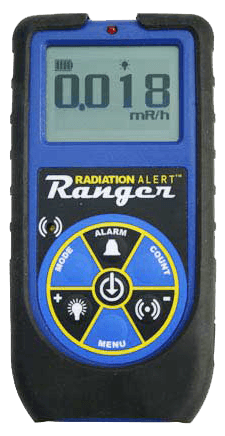Ranger - Geiger Counter
The Ranger is a small, handheld, GM detector-based, digital radiation meter that offers excellent sensitivity to low levels of alpha, beta, gamma, and x-ray radiation. It will measure both exposure and contamination activity which makes it very versatile.
The Ranger is equipped with an auto-ranging backlit digital display with large size character readouts. The direct measurement readout via the digital display ensures there’s no confusion on what the radiation measurement level is at anytime measurements are being taken. Many find the older analog meters that employ manual range switching and the need to perform mental calculations to derive the actual measurement level too confusing and difficult to use.
Other features include a rubber case for added protection, an adjustable timer, and an optional wipe test plate for swipes.
The Ranger is a newer digital design that utilizes modern circuitry. This new design promotes greater robustness, lower power consumption, and longer battery life. When you look at all its operational features, simplicity of use, and low cost, we find it an ideal fit for our customers.
Regulation Requirements for Radiation Meters
According to NUREG 1556, you only need access to a radiation meter; you don’t actually have to own one. Nuclear gauges and irradiators are inherently safe and regulations prevent tampering with them unless it’s performed by highly trained and properly outfitted service entities like Radiation Solutions who bring along their own radiation survey meters and dosimetry.
These radiation meters are only required whenever installing, re-locating, removing, repairing, or changing the physical arrangement or conditions surrounding the gauge or irradiator. As these types of activities are almost always contracted out to experts like Radiation Solutions, regulations do not force you to own one.
The need still exists; however, in the event of an emergency, to access one very quickly. Incidents out of the RSO’s control due to forces of nature; i.e. earthquakes, hurricanes, floods, or unexpected process anomalies resulting in explosions, fires, etc., can bring about the necessity for immediate access to one or more radiation meters to quickly assess the situation from a radiological perspective. In such cases, immediate access to a radiation meter could make the difference between life and death or at the very least prevent possible over exposures or widening the foot print of radioactive contamination.
How Many Meters Should You Buy?
Given the relatively low cost of the radiation meter type required to verify radiation exposure and contamination levels, Radiation Solutions highly recommends purchasing at least one meter. Most companies tend to agree and commonly will have a second backup available. Some of the larger facilities that employ many gauges have upwards of a dozen or more radiation meters on hand. It’s always a good idea to have a working and currently calibrated backup meter readily available in the event one is damaged or away being repaired or calibrated.
How Frequently Do Radiation Meters Need to Be Calibrated?
Unless otherwise specified by the manufacturer, radiation meters typically require re-calibration once every year. During calibration, radiation meters are exposed to three or more known radiation fields that are NIST traceable. You should pick a calibration lab meeting ISO 17025 quality standards to ensure your meter is calibrated correctly. Calibration service turn-around times typically range from 5-10 days. So when you add shipping time to and from the cal lab, your meter could be unavailable anywhere from two weeks to a month. This is why many companies find owning a second meter a wise investment.


